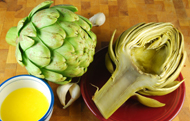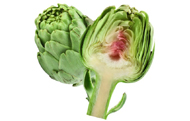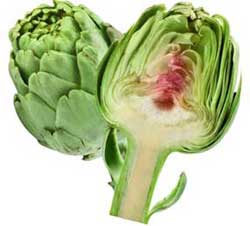





1. Artichoke Facts
2. Types of Artichoke
3. Artichoke Nutritional value
4. Artichoke Health Benefits
The Globe Artichoke (Cynara cardunculus var. scolymus) is classified as a "thistle" species, which is cultivated as food
History and Origin
Not to be confused with the Jerusalem or the Chinese Artichoke (neither is any relation to the common Globe Artichoke), this vegetable is native to the Mediterranean, (i.e. the Canary Islands, Greece, Italy, Yugoslavia, southern France, Portugal, Spain, north-western Libya, northern Morocco, Tunisia, Cyprus and Turkey). There is also a commercial production of the Globe Artichoke in the six central coastal counties of California, from Marin to Santa Barbara.
According to legend the artichoke was created when the Greek God, Zeus turned his love interest into a "thistle" after being rejected. Despite its beginnings, the ancient population considered it to be full of health benefits, using it as an aphrodisiac, a diuretic, a breath freshener and a deodorant.
- • Purple Italian Globe
- • The Big Heart
- • Classic Green Globe
- • Violeta
- • Romanesco
- • Colorado Star
- • Baby Artichokes
- • Jerusalem Artichoke
- • Cardoon
The main types of artichokes are globe artichokes, which are the familiar large, round varieties like the 'Green Globe', and elongated artichokes, such as 'Violetta' and 'Romanesco'. A third, distinct type is the Jerusalem artichoke, which is a different plant that produces an edible tuber, unlike the globe artichoke which is the flower bud of a thistle relative. Other variations include smaller baby artichokes and specialty types developed for colour, flavour, or commercial use.
Globe artichokes
Green Globe: The most common type, it has a spherical shape and a creamy, buttery heart.
Purple Italian Globe: Similar to the Green Globe, but with a violet hue. Some of the colour fades when cooked.
Big Heart: A large, dense variety with a heavy bud, developed to be excellent for stuffing.
Imperial Star: A variety known for good yield and success in colder climates.
Elongated artichokes
Violeta: A spineless variety that is more tapered and elongated.
Romanesco: A large, round-to-conical Italian variety with a finer flavour, often appearing violet.
Colorado Star: A small-plant variety that produces large taste and is suited for colder climates.
Other Artichoke types
Jerusalem Artichoke: A completely different plant from a sunflower family that produces edible tubers, not flower buds.
Baby Artichokes: Smaller versions of globe artichokes, like the Baby Anzo, that can be eaten whole.
Cardoon: A related plant grown for its edible leaves and stalks rather than the flower bud.
Vegetables " Artichoke " ( Nutritional value )
Nutritional value per 100 g
Artichokes, (globe or french), cooked, boiled, drained, with salt
|
Nutrient (Proximity)
|
Unit
|
Value
|
Daily Value %
|
|
Energy
|
kcal
|
51
|
2.5%
|
|
Protein
|
g
|
2.89
|
5.7%
|
|
Total lipid (fat)
|
g
|
0.34
|
0.4%
|
|
Carbohydrate, by difference
|
g
|
11.39
|
4.1%
|
|
Fiber, total dietary
|
g
|
5.7
|
20.3%
|
|
Sugars, total
|
g
|
0.99
|
|
|
Minerals
|
|||
|
Calcium, Ca
|
mg
|
21
|
1.6%
|
|
Iron, Fe
|
mg
|
0.61
|
3.3%
|
|
Magnesium, Mg
|
mg
|
42
|
10%
|
|
Phosphorus, P
|
mg
|
73
|
5.8%
|
|
Potassium, K
|
mg
|
286
|
6%
|
|
Sodium, Na
|
mg
|
296
|
12.8%
|
|
Zinc, Zn
|
mg
|
0.40
|
3.6%
|
|
Copper, Cu
|
mg
|
0.127
|
14.1%
|
|
Manganese, Mn
|
mg
|
0.225
|
9.7%
|
|
Selenium, Se
|
mcg
|
0.2
|
0.3%
|
|
Vitamins
|
|||
|
Vitamin C, total (ascorbic acid)
|
mg
|
7.4
|
8.2%
|
|
Thiamin (B-1)
|
mg
|
0.050
|
4.1%
|
|
Riboflavin (B-2)
|
mg
|
0.089
|
6.8%
|
|
Niacin NE (niacin) (B-3)
|
mg
|
1.110
|
6.9%
|
|
Pantothenic acid (B-5)
|
mg
|
0.240
|
4.8%
|
|
Vitamin (B-6)
|
mg
|
0.081
|
4.7%
|
|
Folate DFE (dietary folate) (B-9)
|
mcg
|
89
|
22.2%
|
|
Choline, total
|
mg
|
34.4
|
6.2% |
|
Vitamin A, RAE (retinol)
|
mcg
|
1
|
0.1%
|
|
Vitamin E (alpha-tocopherol)
|
mg
|
0.19
|
1.2%
|
|
Vitamin K (phylloquinone)
|
mcg
|
14.8
|
12.3%
|
|
Lipids
|
|||
|
Saturated Fatty Acids
|
g
|
0.079
|
|
|
Monounsaturated Fatty Acids
|
g
|
0.011
|
|
|
Polyunsaturated Fatty Acids
|
g
|
0.145
|
|
|
Trans Fatty Acids
|
g
|
0.000
|
|
|
Carotenoids
|
|||
|
Beta-Carotene
|
mcg
|
8
|
|
|
Lutein + zeaxanthin
|
mcg
|
464
|
|

|
Reference Values are based on a 2,000 Calorie Intake, for Adults and Children 4 or More Years of Age. Your daily values may be higher or lower depending on your calorie needs.
|
|
Percentages are roughly approximated using (RDA) Recommended Dietary Allowances for adults. Source: USDA United States Department of Agriculture
|
|
Reference Values for Nutrition - FDA U.S. Food and Drug Administration
|
Artichoke Nutritional Value
Artichokes offer numerous health benefits, including supporting heart, liver, and digestive health due to their high content of fiber, antioxidants, vitamins, and minerals. They can help lower "bad" cholesterol, regulate blood sugar, lower blood pressure, and protect the liver from damage.
Research indicates that artichokes are a super food, being high in phytonutrient content. The phytonutrients in artichokes provide one of the highest antioxidant capacities reported for known vegetables. 120g of artichoke contains enough dietary fiber to not only keep you regular but improve the entire digestive system. Studies have shown artichokes to aid digestion, liver, and gallbladder function, reduce cholesterol, aid bloating, flatulence, heart burn and irritable bowel syndrome.
Other benefits not listed on table below:
Protects liver cells - Artichokes can protect liver cells through their antioxidant properties and by reducing inflammation and cell death, particularly in the context of conditions like non-alcoholic fatty liver disease. Studies in both animals and humans suggest that artichoke leaf extract can help with liver health, though it is not yet proven to treat liver diseases in humans.
Rich in vitamins and minerals - Artichokes provide support through a rich supply of vitamins and minerals, including Folate, Vitamin C, and Vitamin K, which are essential for cell division, immunity, and blood clotting, respectively. They also deliver key minerals like potassium (for heart function), magnesium (for muscle and nerve function), and phosphorus. Additionally, artichokes are packed with antioxidants and phytochemicals that support a healthy digestive system and liver function.
- BOOSTS IMMUNITY
Artichokes boost immunity due to their rich content of immune-supporting nutrients like vitamin C, fiber (inulin), and antioxidants. Vitamin C helps the body fight infections, while inulin feeds beneficial gut bacteria, and antioxidants protect cells from damage, all of which are vital for a strong immune system. - SUPPORTS DETOXIFICATION
Artichokes support detoxification by boosting bile production, which helps the liver remove toxins. They contain antioxidants and phytonutrients that help neutralize harmful free radicals and protect the liver from damage. Additionally, artichokes may help lower "bad" cholesterol and improve overall liver health. - REGULATES BLOOD SUGAR
Artichokes can help regulate blood sugar due to their high fiber content and beneficial compounds. Their fiber, particularly the soluble fiber inulin, helps with fullness and can prevent sharp blood sugar spikes. Studies show that artichokes and artichoke extract can significantly lower fasting blood sugar levels. - HELP WITH IRRITABLE BOWEL SYNDROME
Artichokes may help with irritable bowel syndrome (IBS) symptoms, particularly those related to indigestion and bowel regularity, due to their fiber and prebiotic content. Artichoke leaf extract has shown promise in some studies for improving IBS symptoms like bloating, abdominal pain, and irregular bowel movements, but more research is needed.

- PROVIDES ANTIOXIDANTS
Artichokes provide antioxidants, particularly due to their high content of phenolic compounds like cynarin, silymarin, and chlorogenic acid. These antioxidants protect cells from damage, support liver and gut function, and contribute to a variety of health benefits, which is why they are considered to have one of the highest antioxidant capacities among vegetables. - SUPPORTS HEART HEALTH
Artichokes support heart health by lowering cholesterol and blood pressure, improving blood flow, and providing beneficial nutrients like fiber, potassium, and magnesium. These properties help reduce the risk of cardiovascular disease. - SUPPORTS BRAIN FUNCTION
Artichokes support brain function primarily through antioxidants and beneficial compounds like luteolin and folate. They may protect against oxidative stress and inflammation, inhibit enzymes that break down important neurotransmitters, and potentially improve cognitive functions like memory and concentration. - SUPPORTS DIGESTIVE HEALTH
Artichokes support digestive health by providing high levels of fiber, which promotes regular bowel movements, and prebiotics like inulin, which nourish beneficial gut bacteria. They are also used to relieve symptoms like indigestion, bloating, and gas, and compounds like cynarin and silymarin can stimulate bile production to aid fat digestion and help detoxify the liver.
References
Nutrient Database - USDA (United States Department of Agriculture)
Reference Values for Nutrition - FDA (U.S. Food and Drug Administration)
Supports Heart health - Artichokes support heart health by lowering cholesterol and blood pressure, improving blood flow, and providing beneficial nutrients like fiber, potassium, and magnesium. These properties help reduce the risk of cardiovascular disease.
Provides antioxidants - Artichokes provide antioxidants, particularly due to their high content of phenolic compounds like cynarin, silymarin, and chlorogenic acid. These antioxidants protect cells from damage, support liver and gut function, and contribute to a variety of health benefits, which is why they are considered to have one of the highest antioxidant capacities among vegetables.
Protects liver cells - Artichokes can protect liver cells through their antioxidant properties and by reducing inflammation and cell death, particularly in the context of conditions like non-alcoholic fatty liver disease. Studies in both animals and humans suggest that artichoke leaf extract can help with liver health, though it is not yet proven to treat liver diseases in humans.
Supports detoxification - Artichokes support detoxification by boosting bile production, which helps the liver remove toxins. They contain antioxidants and phytonutrients that help neutralize harmful free radicals and protect the liver from damage. Additionally, artichokes may help lower "bad" cholesterol and improve overall liver health.
Supports digestive health - Artichokes support digestive health by providing high levels of fiber, which promotes regular bowel movements, and prebiotics like inulin, which nourish beneficial gut bacteria. They are also used to relieve symptoms like indigestion, bloating, and gas, and compounds like cynarin and silymarin can stimulate bile production to aid fat digestion and help detoxify the liver.
Boosts immunity - Artichokes boost immunity due to their rich content of immune-supporting nutrients like vitamin C, fiber (inulin), and antioxidants. Vitamin C helps the body fight infections, while inulin feeds beneficial gut bacteria, and antioxidants protect cells from damage, all of which are vital for a strong immune system.
Regulates blood sugar - Artichokes can help regulate blood sugar due to their high fiber content and beneficial compounds. Their fiber, particularly the soluble fiber inulin, helps with fullness and can prevent sharp blood sugar spikes. Studies show that artichokes and artichoke extract can significantly lower fasting blood sugar levels.
Supports brain function - Artichokes support brain function primarily through antioxidants and beneficial compounds like luteolin and folate. They may protect against oxidative stress and inflammation, inhibit enzymes that break down important neurotransmitters, and potentially improve cognitive functions like memory and concentration.
Rich in vitamins and minerals - Artichokes provide support through a rich supply of vitamins and minerals, including Folate, Vitamin C, and Vitamin K, which are essential for cell division, immunity, and blood clotting, respectively. They also deliver key minerals like potassium (for heart function), magnesium (for muscle and nerve function), and phosphorus. Additionally, artichokes are packed with antioxidants and phytochemicals that support a healthy digestive system and liver function.
Help with Irritable Bowel Syndrome - Artichokes may help with irritable bowel syndrome (IBS) symptoms, particularly those related to indigestion and bowel regularity, due to their fiber and prebiotic content. Artichoke leaf extract has shown promise in some studies for improving IBS symptoms like bloating, abdominal pain, and irregular bowel movements, but more research is needed to confirm these effects.
Artichokes possess one of the highest antioxidant capacities among vegetables (largely due to their high content of phenolic compounds like cynarin, silymarin, and chlorogenic acid). These antioxidants combat damaging free radicals in the body and contribute to various health benefits, including improved liver and gut function, reduced cholesterol levels, and protection against certain cancers. Cooking methods like steaming can further enhance the accessibility of these beneficial compounds.
Artichoke, particularly artichoke leaf extract, is well-known for its choleretic action, meaning it can increase the production and flow of bile, aiding digestion, fat assimilation, and liver health. Research in both humans and animals has demonstrated that artichoke extract significantly increases bile secretion, which helps to eliminate toxins from the liver and regulate digestive function.
Artichokes support brain health (by providing Vitamin K, which is vital for protecting against neuronal damage and may lower the risk of Alzheimer's disease and dementia). They also act as a vasodilator (substance that causes blood vessels to dilate (widen)), improving blood flow and oxygen to the brain, which enhances cognitive ability. The neuroprotective effects of artichoke extract are also being studied, suggesting potential benefits for cognitive function and memory.
Artichokes can help lower blood pressure (because they are high in potassium, a mineral that helps regulate blood pressure by counteracting the effects of sodium and facilitating the elimination of sodium from the body).
Artichokes are an excellent source of dietary fiber (making them a good choice for promoting bowel regularity and overall digestive health). Their high fiber content, particularly the prebiotic inulin, helps to add bulk to stool and supports a healthy gut microbiome, which contributes to consistent bowel movements and can alleviate constipation.
Cancer-Preventing Antioxidants (Artichokes contain the highest levels of antioxidants of any vegetable (polyphenols, flavonoids, anthocyanins among others) and are loaded with an army of beneficial nutrients that can protect the body from cancer). Artichokes are also a good source of vitamin C. Studies have shown that people with high intakes of vitamin C from fruits and vegetables might have a lower risk of getting many types of cancer, including lung, breast and colon cancer.
Artichokes support bone and joint health (by providing nutrients like Vitamin K, Manganese, and Vitamin C, which are essential for bone formation and collagen production). Manganese helps produce collagen, a key protein in bone and joint tissues, while Vitamin K is vital for bone health and preventing fractures. Additionally, artichokes contain antioxidants and minerals like magnesium and potassium that combat cell damage and support overall bodily functions, including muscle and nerve health, which are important for joint stability.
Is Artichoke a Forgotten Fertility Food (Artichokes are a good source of folate (vitamin B9).
Artichokes support liver health (by reducing fat accumulation and liver enzymes, as seen in clinical trials for non-alcoholic fatty liver disease, and their antioxidant compounds like chlorogenic acid protect against oxidative stress).
Lipid-lowering activity of artichoke (Artichoke extract has been shown to lower total blood cholesterol and LDL (bad) cholesterol).
